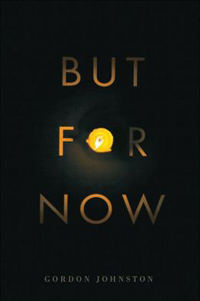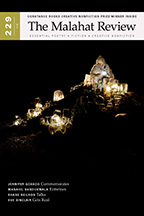Poetry Reviews by Donna Kane
Danny Jacobs, Songs That Remind Us of Factories (Gibsons: Nightwood, 2013). Paperbound, 80 pp., $18.95.
Gordon Johnston, But for Now (Montreal: McGill-Queen’s, 2013). Paperbound, 96 pp., $16.95.
When I began reading Gordon Johnston’s But for Now and Danny Jacobs’ Songs That Remind Us of Factories, the two books seemed an antonymous pairing, judged first by their covers—Johnston’s being black with a small glow of candlelight emanating from the centre, barely illuminating the crimson letters of the title, while Jacobs’ cover sports a bright 3d optical illusion. Then, in their cataloguing pages, the authors’ demographic differences are made clear—Johnston is in his sixties, Jacobs half that age. In the author bios we are told that Johnston is recently retired; Jacobs is just embarking on his career. And then there are the poems: think nougat versus Pop Rocks, velvet versus quills. Johnston’s language is deceptively simple, as with, “the Caillebotte workers / are scraping the floor / in a beautiful world / in which one works; / one kneels / but without the loss / of one’s dignity” (“1 Les Raboteurs De Parquet”). Jacobs, on the other hand, is a linguistic wunderkind, “Despot phlebotomist, / pathogen change purse, / you snub the rare sting, / the sporadic way feeble / bees swell the tongues / of clumsy Frisbee-golfers.” (“vii. Culex pipiens”). Jacobs’ words are razzmatazz, Johnston’s, to quote the final lines of his “1 Les Raboteurs De Parquet,” are “plain / and beautiful.”
 It would be easy enough to chalk up the stylistic differences as generational. Jacobs’ poetry is of the kind embraced by many of his contemporaries, a cerebral exuberance seen in the works of, say, Linda Besner or Jeramy Dodds, to name just two. Also in keeping with many of his peers, the “I” in Jacobs’ poems is less visible, and when it does arise, it serves more as an impartial observer, as in “Weeding”: “I could bust up the pest party, spray / strapped in, tanked toxic slosh.” The “I” of Johnston’s poems is more emotionally invested, imbued with a consistent and singular personality, as in “Visiting Poet”— “I’ve brought them a sleeping bag / but in the jumble in the back of the car / I only find the little blankets / from my granddaughter’s crib.” Johnston’s style is more in the flavour of his contemporaries, poets such as Jane Hirschfield, who Johnson quotes in the poem, “Caged.” But there’s more at work here than age or influence, and while the differences invite comparison, the similarities prove compelling too. Both books include poem sequences that use titles to exoticize the ordinary. Johnston uses French titles for poems concerned with janitors and mud while Jacobs uses Latin titles to name common insects like the mosquito and house fly. Both poets pay attention to form, fancying everything from sonnets to end-rhymed couplets and quatrains. Both are in control of their individual styles; each knows where to draw the line, and in particular, their end lines. Johnston’s last lines often leave the reader hanging, providing the necessary pause required to subtly draw out the deeper resonances of a plainer verse. In “The Rivers of God are full of Water,” Johnston writes, “Today, I diverted water / through a tiny channel / into a drying pond / and felt a little like the kind of god / who alters the course / of minor histories, / a tributary son of Scamander: // a few frogs leaped away / from my approach; / a few fish and their shadows darted / into the freshing pond / before I turned away.” Jacobs’ final lines are often more overt, and they can afford to be. Melodrama occurs when we are given exaggerated turns. Jacobs’ poems are flamboyant enough that they hold up, even welcome, such concrete sure-footed end lines as in "i. Chalybion californicum," from the brilliant section, “Domestic Entomology”: “O spindly gaggle of sticks, / o gangly wicket, o cerulean jewel, / o robo-drone, / go back / to your overlords, / we may mean you harm.” While Jacobs serves up ode-like calls to insects and machines, Johnston gives us odes as well, though his more often address what seems a more traditional God: “Where are you now, O god? / Are you at the end / Of this tunnel? / Are you in some possible sky? / Help me to see you / in this faceless mud” (“A New Psalm, In a Deep Pit”).
It would be easy enough to chalk up the stylistic differences as generational. Jacobs’ poetry is of the kind embraced by many of his contemporaries, a cerebral exuberance seen in the works of, say, Linda Besner or Jeramy Dodds, to name just two. Also in keeping with many of his peers, the “I” in Jacobs’ poems is less visible, and when it does arise, it serves more as an impartial observer, as in “Weeding”: “I could bust up the pest party, spray / strapped in, tanked toxic slosh.” The “I” of Johnston’s poems is more emotionally invested, imbued with a consistent and singular personality, as in “Visiting Poet”— “I’ve brought them a sleeping bag / but in the jumble in the back of the car / I only find the little blankets / from my granddaughter’s crib.” Johnston’s style is more in the flavour of his contemporaries, poets such as Jane Hirschfield, who Johnson quotes in the poem, “Caged.” But there’s more at work here than age or influence, and while the differences invite comparison, the similarities prove compelling too. Both books include poem sequences that use titles to exoticize the ordinary. Johnston uses French titles for poems concerned with janitors and mud while Jacobs uses Latin titles to name common insects like the mosquito and house fly. Both poets pay attention to form, fancying everything from sonnets to end-rhymed couplets and quatrains. Both are in control of their individual styles; each knows where to draw the line, and in particular, their end lines. Johnston’s last lines often leave the reader hanging, providing the necessary pause required to subtly draw out the deeper resonances of a plainer verse. In “The Rivers of God are full of Water,” Johnston writes, “Today, I diverted water / through a tiny channel / into a drying pond / and felt a little like the kind of god / who alters the course / of minor histories, / a tributary son of Scamander: // a few frogs leaped away / from my approach; / a few fish and their shadows darted / into the freshing pond / before I turned away.” Jacobs’ final lines are often more overt, and they can afford to be. Melodrama occurs when we are given exaggerated turns. Jacobs’ poems are flamboyant enough that they hold up, even welcome, such concrete sure-footed end lines as in "i. Chalybion californicum," from the brilliant section, “Domestic Entomology”: “O spindly gaggle of sticks, / o gangly wicket, o cerulean jewel, / o robo-drone, / go back / to your overlords, / we may mean you harm.” While Jacobs serves up ode-like calls to insects and machines, Johnston gives us odes as well, though his more often address what seems a more traditional God: “Where are you now, O god? / Are you at the end / Of this tunnel? / Are you in some possible sky? / Help me to see you / in this faceless mud” (“A New Psalm, In a Deep Pit”).
Both books exude a genuine desire to connect to the outside world. While Johnston’s poems might appear more straightforward in their search for meaning, Jacobs’ poetry is equally solid at its core. In “Ox,” Jacobs writes of the missteps humans make when judging the non-human, “But haughty / me, its eyes all opacity and ennui: / a glance that judged us rubberneckers, / upright dolts.” Under all the playfulness, there is meaning to spare. While Jacobs’ language may seem to do more in the arena of dazzle and delight, Johnston’s voice is possessed of its own quirkiness, as with “Pianissimo,” in which the narrator expresses his disappointment at how little we are rewarded for our searching, “What I’d like is everything / unpackaged, no more need / to fight through shrink-wrapped / cardboard and Styrofoam / containers to get to the nourishment. / Or to peel away flakes of tinfoil and waxed paper / just for the sake / of a little life-saver.” Like the narrator in Johnston’s “The Bach Suite,” I could “stand the excitement” of both of these writers, in part, because I trusted each to get me back home.











